Emonberry Red
There was no need to trouble the Agent for this; it simply required Adrasteia's shears. Such a shame, she thought, and sighed aloud. Her two sisters, one at the far end of the enormous and ancient oak table, the other at the side midway between the two, paused their work on a great tapestry spread out between them to look up.
Two threads, one blue, the other gold, which had begun their journey through the tapestry in parallel, had now become intertwined. This happened all the time, and each time it was a new entanglement, sometimes beautiful, sometimes tragic, sometimes both. Such beauty could be found in tragedy; however, Adrasteia did not allow herself to be influenced by what she witnessed among the threads of the tapestry. She must consider the welfare of the whole. These two particular threads had, indeed, created a beautiful pattern as they wound about one another, bordered on all sides by darker-hued threads in patterns that seemed intent upon pulling the blue and gold apart.
The weavework of these two was unconventional, so singular in its expression that even Adrasteia, whose detachment and efficiency were renowned, indulged a longer moment of appreciation. The moment passed, and it was time for her to get to work with her shears on the snarl that had developed in the threads.
Pavios lay awake in his dark room. Heliod had long since ridden below the horizon. Despite an exhausting day walking what surely must have been every avenue and alley of the polis of Akros in tow behind his father—who insisted on introducing Pavios to an endless list of government officials and diplomats, bankers and business people—Pavios could not sleep. He thought only of Thanasis, who lay just on the other side of the wall behind his head. He wondered if Thanasis had read the note Pavios had left for him, and found the gift he had hidden earlier, behind their adjoining houses, beneath the pile of coal Thanasis's father used in his smithing.
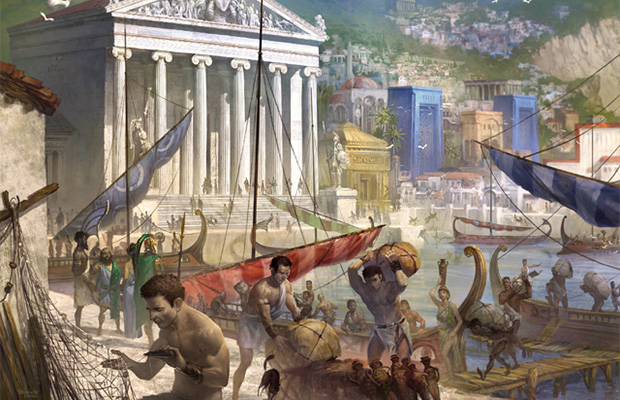
Temple of Enlightenment | Art by Svetlin Velinov
A knot clenched in Pavios's throat the more he thought about not seeing Thanasis again. Just two days hence, Pavios's father planned to send him back to Meletis to marry the daughter of a prominent official—a sweet but uninteresting girl whose soft face shone perpetually clean and rosy, as if she scrubbed it every hour. The girl's father had presented a fine short sword to Pavios to seal the contract between the two families. Pavios had stood motionless, unable to move to take the sword. His arms felt too heavy. The sword might as well have been manacles binding him to this girl and the political designs of their fathers. His father stepped forward quickly and accepted the gift on Pavios's behalf. It was done.
In two days, he would never see Thanasis again, and the thought made sleep seem like a waste of precious time.
It had become very difficult to communicate with Thanasis, and letting him know where to look for the gift had not been easy. Although they lived next to one another, separated by that simple masonry wall, their parents were not friends, and they may as well have lived on opposite sides of Akros. The fathers of the two families avoided any interaction with one another. Pavios's father was an ambassador from Meletis, and the two of them had relocated to Akros six months before. It was not an assignment Pavios's father desired, and uprooting to take a post in Akros was to him a demotion that cast him into a perpetual brood. It was not long after taking up this residence in the small home next to the blacksmith that the fathers quarreled, and Pavios was forbidden from associating with the blacksmith's quiet and handsome son.
As Pavios tossed in the dark, it occurred to him that he did not know if Thanasis could read. He had assumed it when, early that morning, he had stolen a piece of parchment, a pot of ink, and a quill from his father's office before his father took them on their political traipse around the polis. Their course brought them close enough to their new home to justify a stop there for a midday repast. Pavios had slipped into his room and quickly written a note, telling Thanasis to search the coal pile. He had stuffed the note into his shirt and rejoined his father at the table. He ate a biscuit quickly, but kept watch through the window on the smithy across the street.
Thanasis was apprenticed to his father, training as a blacksmith. Pavios could see both father and son at work. Soot smudged Thanasis's face. His face was always smudged with soot, which made him appear hard and serious, until he smiled or spoke. When he worked with his father, he did neither, his heat-flushed face like the glowing metal he plunged into water, hardened and glistening.
Thanasis's father disappeared from view. Pavios excused himself from the table and stepped outside before his father could ask where he was going.
It only took a moment for their eyes to meet. Thanasis had apparently seen him return home with his father and had been watching for him to re-emerge from the house. The frown on Thanasis's face melted into an acknowledging smile. Pavios pulled the note from his shirt so Thanasis saw it. Pavios rolled up the note and placed it beneath a stone near the door to Thanasis's house. When he turned back around, Thanasis was no longer watching. His frown had returned, along with Thanasis's father. Had he seen where Pavios had hidden the note? Pavios had no way to check, as his own father stepped from the house, walking stick in hand, and bade him to come along.
Thanasis was unhappy, Pavios learned, much like he was. He did not want to be a blacksmith.
"I want to be a Lukos," Thanasis had told him the first time they met, in those wonderful days before their fathers' quarrel, when they were not restricted from seeing one another. Thanasis had shown him a secret spot just outside Akros, a broad but secluded outcropping just off the narrow switchback that led down through the mountains outside the polis walls. Although not far from Akros, they could neither see the polis's battlements nor hear the noise of its streets from the outcropping. A single emonberry tree grew near the edge of the outcropping, its low branches weighed down with its tart, white fruit. Rabbits from a nearby warren frequented the place, nibbling at the occasional green shoots and grasses growing in patches around the tree's base.

Mountain | Art by Raoul Vitale
"A Lukos?"
"A wolf of the Akroan army," Thanasis replied. "They are the toughest warriors in all of Theros."
Thanasis told Pavios the epic stories of Akros. They sat next to each other, their backs against an enormous sun-warmed boulder, legs outstretched, their dusty sandals kicked off. Thanasis was animated as he told the tales, and his foot brushed against Pavios's. Pavios could not help but be swept into the powerful current of Thanasis's enthusiasm as he spoke of the Army. He allowed it to carry him, his heart borne like a floating leaf.
Pavios knew very little about his new home and the warrior culture of the Akroan people. At first, he had resented them, blaming them for the move from his home in the beautiful city of Meletis out into these isolated mountains. Leaving Meletis, he had been forced to abandon his studies at the Dekatia—there were no Thaumaturges in Akros with whom he could continue his magic tutelage and magic was one of the few things Pavios enjoyed. It promised a path away from his father's ambitions for him. In Akros, his father's oppressive expectations and command over his life were inescapable. It was all the fault of these rude and aggressive Akroans.
However, Pavios could not stoke that resentment for long after meeting Thanasis. Pavios never heard Thanasis speak against anyone harshly, not even his own father, who stood athwart his hopes of training as a warrior at the great Kolophon, the unbreachable stone heart of the Akroan polis. Instead, Thanasis had been pressed into apprenticeship to his father. He seemed to bear this disappointment well, far better than Pavios felt he could. Thanasis seemed built to endure anything, tall and tanned, his shoulders broad and solid, like the quadrant arches that strengthened the massive walls of some of the magnificent stone buildings in Meletis. He kept his black hair cropped short in the way of new recruits in the Army. Thanasis would make a great warrior, he was certain.
During the first two months they had known one another, they met as often as possible on the outcropping. Pavios began to share some of his own stories, and entertained Thanasis with riddles and simple cantrips he'd learned during his time at the Dekatia. He was slow to open up with more personal stories, though, and did not share his betrothal to the girl in Meletis.
The days grew shorter and the air cooler in the mountains, but still the two met to tell each other stories. On one particularly chill day, Pavios, in his haste to escape his father's incessant planning of what they would do once they were back in Meletis and Pavios was married, left his house without his cloak. The mistake didn't occur to him until he had stepped outside the protective walls of Akros and the cold mountain breeze nipped him. Fetching his cloak would make him late to meet Thanasis and might invite questions from his father, so he continued on.
The two sat together as usual, although the great boulder was cold pressing into Pavios's back and the sun dipped often behind clouds, causing him to shiver. In the midst of telling a story about One-Eye Pass and the heroics of the Akroans who fought the cyclopes who lived there, Thanasis removed his own cloak and wrapped it around Pavios without missing a beat in the climax of his narrative. The simple cloak was lined with rabbit fur, and the leather was soft from many years of use. It carried the scent of smoke and hammered bronze, and of Thanasis himself. When Pavios pulled the cloak about him and the fur collar closed around his neck, he breathed the intimate, comforting scent of his friend.
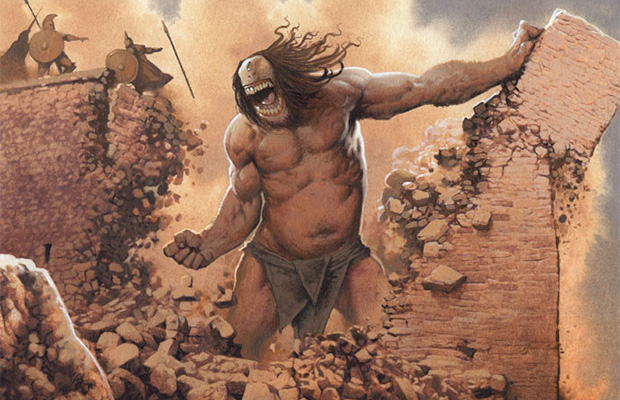
Cyclops of One-Eyed Pass | Art by Kev Walker
When Heliod touched the horizon, they rose to walk back to the polis. Pavios began to untie the cloak, but Thanasis placed a hand on his shoulder. "You may keep it," he said. Pavios wore the cloak every day from then on during that cold season.
Thanasis had shared painful stories as well. He stared at the ground as he told the story of his mother, and how she had died just three months before Pavios arrived in Akros. Although she was a fiercely independent artisan who traveled often to sell the pottery and jewelry she made, she always kept a reliable schedule with her family of when she would return home from her trips. One day, she did not return. Thanasis and his father searched for her until they came across her satchel in the mountains far from the road, torn and bloodstained, her craft jewelry spilling out of it. She had been taken by a beast, it was clear, although they never found her remains. Not long after, his father's reticence over Thanasis joining the Akroan army hardened into unwavering prohibition.
When Thanasis finished the story, he looked up. His eyes were rimmed with red. There were no tears in them, but a resilience that struggled to hold in a swollen tide of sadness and loss. Pavios saw something else there, too, he thought: a reaching out from aloneness, and a growing love for his friend. Or, was he seeing merely a reflection of himself? No, it was there, he was certain.
Pavios pulled him close, embracing him, and kissed his cheek. Thanasis tightened suddenly, as if surprised by Pavios's forwardness, his shoulders setting like a wall between them. He did not embrace Pavios in return. The moment ended abruptly and Pavios released him. They put on their sandals and walked the switchback home to Akros in silence.
The following day, the disagreement between their fathers erupted and there were no more meetings on the outcropping. Then, three days before Pavios left the note for Thanasis, Pavios's father announced he would leave for Meletis at the end of the week in order to prepare for his son's upcoming wedding.
Pavios drifted into sleep, but awoke when something tapped him on his forehead. He brushed a hand across his face and found a pebble in his hair. He sat up and rolled it between his fingers in the dark. As he considered getting up to light a candle and examine it, another pebble landed on his head. He heard a whisper. It sounded like his name.
"Pavios." It came from above him. Pavios stood on the bed and was still, listening.
"Pavios, it's me, Thanasis."
The sound was coming from the wall, but it sounded as if Thanasis was in the room with him. Pavios ran his hand along the wall and discovered a small crack. He peered into the crack but could see nothing in the darkness. He leaned in close. "Thanasis?"
"Pavios!" Thanasis's voice rose. "You sleep like you are dead."
Pavios's heard pounded. "I'm so happy to hear your voice," he said. In that moment just how much he had missed his friend overwhelmed him. "I'm so happy to hear your voice," he repeated, loudly, feeling suddenly foolish.
"Shhh! You'll wake our fathers."
"My father won't let me see you. He drags me all over the polis every day now while he works."
"Mine will also not let me see you," Thanasis replied. There was a long pause. "Pavios?"
"Yes," Pavios answered quietly. "I am here."
"I want to see you."
Pavios felt that if he opened his mouth to speak, he would not be able to keep himself from shouting with excitement. Or worse, he might awaken and this would be nothing more than a dream. He wanted to respond, "Yes! I want to see you, too!" and pound the wall between them until it fell into rubble, but he could not seem to even exhale at the moment, much less lift his arms to such a task.
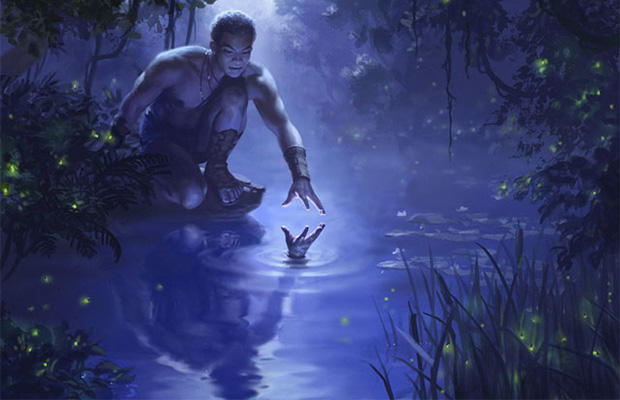
Fated Infatuation | Art by Winona Nelson
"Can we meet again?" Thanasis's voice was quieter.
Pavios found his breath and leaned against the wall. "I wasn't sure—" he started, hesitating, "—after the last time. I mean—" he stammered. "Yes," he said, finally.
"Can you meet tomorrow at midday?"
"I will find a way."
"I will wait for you," Thanasis said. "Goodnight, Pavios."
"Goodnight, Thanasis." Pavios crawled back beneath his covers.
"And thank you for the gift, Pavios."
Pavios smiled and could not wait to fall asleep. He pulled the rabbit fur cloak that lay spread across his bed up to his chin, breathed deeply, and drifted into sleep.
The snarl of thread was proving difficult. Adrasteia massaged it between her soft and wrinkled fingers, teasing at it with a hook in an attempt to separate the threads. Perhaps one could be saved to continue its winding journey? Alas, the clever technique her sister had employed in weaving these two together bound their destinies so closely that attempts to end just one was unwise. One was the warp, the other the weft, and one without the other could weaken the tapestry, leaving it prone to irreparable tears. Although she and her sisters controlled many things in the destinies of all in Theros —even at times the gods themselves—there were rules that should not be bent, and a few that must never, ever be broken.
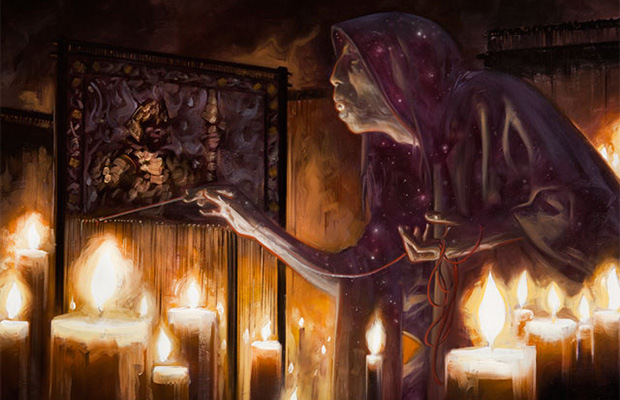
Fate Unraveler | Art by David Palumbo
From beneath the table she withdrew a roughly hewn, darkly stained box made from the ancient, knotty wood of a tree that never grew in the world. The box's silver hinges made no sound as she opened it. Velvet the color of ripened plums lined the interior, and three implements lay neatly at the bottom: a sliver thimble; a long, delicate bone bodkin; and a pair of crooked ebony shears. Adrasteia took the shears and replaced the box beneath the table.
The shears were as black as an empty night sky, reflecting none of the amber candlelight or the ubiquitous realm of Nyx. The blades began at their handles, straight and sharp, sliding together precisely, but as they closed each became noticeably misaligned, bending slightly and then impossibly into and then past the other until the scissoring ceased. The shears could never be fully closed. Purphoros had offered to forge her a new set long ago, an offer she and her sisters had cackled continuously over for a good thirty-three years afterward.
Adrasteia returned to the snarl of the threads. One can view too critically the state of individual threads, she thought, to the exclusion of the artistic value of what mortals or gods would call flaws. A flaw implies judgment, which requires criteria based around a set of exclusions, and these are expected to remain consistent from one moment to the next. Such things are illusions in this room. Fate has no flaws, nor an enduring aesthetic. The only true beauty is a dispassionate completeness.
Still, in fleeting moments, Adrasteia experienced beauty in the threads, knew appreciation, and, at times, felt admiration. But those moments passed, and the work always remained, awaiting completion.
There. She tied off the snarl from the back. It was ready. Adrasteia pinched it between her thumb and forefinger, each calloused and hardened from an eternity of pinpricks and the abrading slide of endless threads. She opened her crooked shears wide and positioned the vertex of the blades at the throat of the snarl.
Pavios arrived at the outcropping first. Clouds overcast the sky and it was quite cold. Beneath the cloak, slung across his back, he carried a pack with food, clothing, his knife, the training manual the master Thaumaturge had given him when he had left the Dekatia in Meletis, flint and steel, and various other items necessary to a long trip. Upon awakening early in the morning, before his father, he had made a decision. He would not return to Meletis. The thought of leaving Thanasis and marrying another knotted his stomach, causing a panic to seize him. He didn't know where they'd go, but if Thanasis accepted, they would figure it out.
He hoped Thanasis would bring the gift Pavios had given him, the very short sword given to him in Meletis to finalize the marriage arrangement. If he and Thanasis were destined to be together, the sword would be essential in their fate.
If Thanasis refused, Pavios resolved that he would go on alone. Perhaps he would die; to live without Thanasis would be a life he could not bear. The thought made him nervous. Thanasis could refuse—was he being too presumptuous once again, just as he had that day when last they were together here? He began to sweat. He removed the cloak and his pack, and set the two on the ground. The cold hit him, and he sipped from his wineskin to warm himself.
Pavios heard a growl, deeper and more terrifying than any he had heard from any animal he had ever encountered. Across the broad outcropping and a short way down the switchback he saw a blur of motion. A beast with a thick fleece mane the color of snow tore into a rabbit. Pavios did not move, but watched as the rabbit was killed, torn apart, and consumed in a few quick bites. Blood and fur dripped from the killer's jaws.
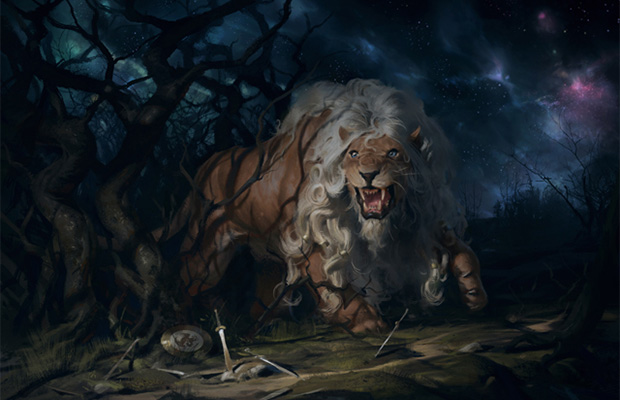
Fleecemane Lion | Art by Slawomir Maniak
It looked up, sniffed the air, and then saw Pavios.
Panicked, Pavios bolted in the opposite direction, passing the emonberry tree and scrambling down the narrow switchback. In all the times he had come here with Thanasis, he had never explored beyond the outcropping and the path they followed to reach it. He did not know where the switchback led beyond their meeting spot, but he had no time to ponder it.
He did not look back. The switchback became narrower and more treacherous, and he couldn't risk losing his footing. And if the beast was behind him, if it was about to spring and take him down, he did not want to know. Better that it happen quickly, as it had for the rabbit.
Pavios reached the bottom of the gorge, but still did not stop or look back. Ahead, he saw a small opening in the rock wall, a small cave. He reached it and clambered inside. He tried to quiet his breathing, tried not to gasp and give away his hiding place.
Pavios did not know for how long or how far he had run. His panting subsided, but he shook with fear and cold. He remained still for a long time, watching for the beast. It never appeared.
A new fear gripped him then. Thanasis would be coming to meet him. He would be walking right into jaws of the beast.
Pavios climbed out of his hiding spot. The beast was nowhere to be seen. He hurried back up the switchback, but it was slow going up the steep gorge wall.
Night was falling as he approached the outcropping, but he could see that the creature had been into his pack. It had scattered his supplies. The pack lay at the end of the outcropping, torn. Blood stained it. Pavios hoped it was blood from the beast's rabbit meal.
Pavios climbed up and onto the outcropping. "Thanasis?" he called. "Are you hiding?"
He heard a ragged breath. Pavios scanned about in the failing light. There, leaning against the emonberry tree, was Thanasis. Blood drenched his tunic. In his chest was thrust the short sword Pavios had given him. Across Thanasis's lap lay the cloak he had given Pavios. It was rent and bloodied; the rabbit fur lining was shredded.
Pavios cried out and rushed to his friend. "What—what has happened?" He reached out to help him, but stopped. What could he do? Should he pull the sword free? Could Thanasis be moved? Was there time to run for help in Akros? His mind filled with crashing thoughts. He took Thanasis's head in his hands, pushed the hair out of his face. Thanasis's eyes drifted open slightly. His skin was pale and cold in Pavios's hands.
"Pavios," Thanasis mouthed the name, but no sound accompanied it. With a great effort, he drew a shallow breath and forced his voice. "I thought it killed you..." His voice trailed off.
"No," Pavios said. His eyes swam with tears. It was becoming terribly clear to him what had happened. "I'm alive. I'm safe." He took the ripped and bloodied cloak and attempted to place it around Thanasis for warmth. Bits of rabbit fur dangled from it and hairs came free, matting in the blood trickling from Thanasis's lips. Thanasis must have discovered the cloak and pack and mistaken the blood for his in a scene horribly reminiscent of his mother's death. In that moment of despair, had Thanasis taken his own life by plunging the sword into his heart?
Thanasis's weak breaths ceased. Night was upon them. Pavios could barely see his friend's face in the darkness and through his tears. He touched his forehead to Thanasis's. "Don't go," he said softly.
Pavios did not pray often. He knew the gods, but there was little time or purpose for prayer. Now, though, he called out to Erebos, the god of the dead. "Mighty Erebos," he entreated, "I love him. Don't..." Pavios swallowed. Although he was not accustomed to praying, he was sure that when one did, it was wise to not make demands of the gods. "Please, Erebos... I cannot live without him."
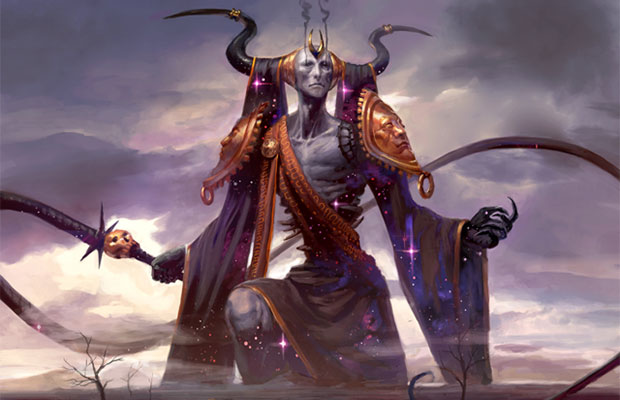
Erebos, God of the Dead | Art by Peter Mohrbacher
The sword.
It was not a voice, but he heard it nonetheless.
You may be with him again, but only in my realm. Use the sword before the warmth of his life leaves his body, and I will permit you to join him.
Erebos had answered him. "Erebos," Pavios said. "I am afraid."
I will ease your passage. There will be no pain.
Pavios took hold of the hilt of the sword and slid it gently from his friend's chest. The metal was warm from Thanasis's body. He stood, turned the blade upon his own heart. He did not believe he had the strength to push it between his ribs, so he turned toward Thanasis and allowed himself to fall forward. The hilt struck the ground, and the blade drove into Pavios's heart. He felt a shock, but it was not pain. In fact, for an instant he felt happiness, and as the blade pushed its way through his body, he laughed aloud. The sensation passed quickly, though, and he closed his eyes, his head at rest in Thanasis's lap.
Beneath them, their blood seeped into the roots of the emonberry tree.
Perhaps it was a momentary distraction as she closed the shears around the threads that caused her to misjudge the snip by a hair's breadth. The shears took the snarl, and along with it the very tip of her thumb. Adrasteia drew a quick breath through her teeth.She sucked at the wound, tasting copper, flat and heavy. Sentimental old fool, she chastised herself, let that be a lesson to you and your silly heart for why you should not be seduced into the travails of mortals.
She leaned over the tapestry, squinting, and saw that a tiny drop of blood had stained it.
Adrasteia placed her crooked shears and the snarl of thread in the box and closed the lid.

